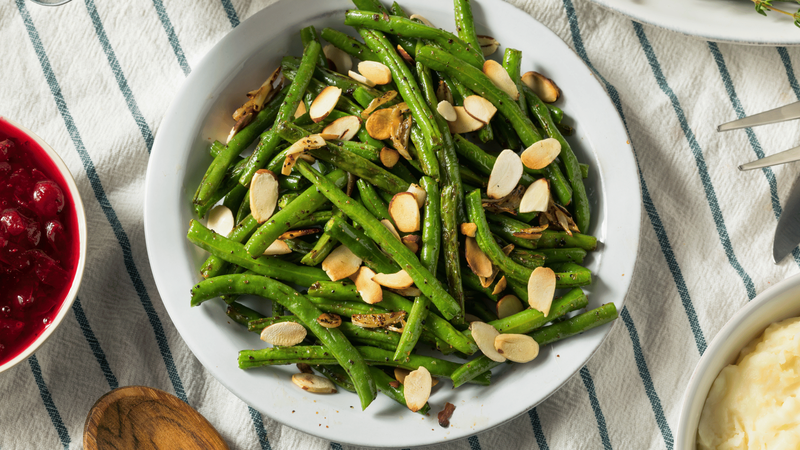Long beans are not only a familiar dish in daily meals but also bring many unexpected health benefits. With abundant fiber, vitamins, minerals and antioxidants, long beans help strengthen the immune system, improve the digestive system, and contribute to beautifying the skin. So what are the effects of eating long beans?
In traditional medicine, long beans are considered a valuable medicine with many effects such as cooling, detoxifying, and diuretic. This type of bean contains many vitamins, minerals, fiber and antioxidant compounds, bringing many benefits such as strengthening cardiovascular health, improving digestion and supporting beauty. So what are the effects of eating long beans? Let’s find out the outstanding benefits of this food right after this.
Long beans and nutritional composition
Long beans, also known as strip beans, are a popular vegetable in the legume family, often grown in tropical areas. With its characteristic long shape, yardlong beans are not only used as an ingredient in many dishes but are also a rich source of nutrients, bringing many health benefits.
The nutritional composition of yardlong beans is very rich. This is a rich source of natural fiber and protein. The fiber in yardlong beans not only supports laxatives but also helps protect the colon mucosa, reducing the time of exposure to toxic substances and cancer-causing chemicals in the intestines. At the same time, fiber also has the ability to reduce blood cholesterol levels, supporting the protection of cardiovascular health.

Green beans are a food with rich nutritional content.
Green beans also contain biochanin A, a plant estrogen that plays an effective role in preventing cancer. This food is also gluten-free, suitable for people with gluten allergies or celiac disease. Here are the nutritional components in 100g of green beans:
- Calories: 47 kcal
- Protein: 2.8g
- Carbohydrates: 8g
- Lipid (fat): 0.4g (of which saturated fat accounts for 0.1g)
- Cholesterol: 0mg (no cholesterol)
- Sodium (salt): 4mg
- Potassium: 240mg
- Vitamin C: 18.8mg
- Iron: 0.5mg
- Magnesium: 44mg
- Calcium: 50mg
- Vitamin D: 0 IU
- Vitamin B12: 0 µg
- Vitamin B6: 0 mg
Green beans are not only rich in protein and fiber, but also contain many essential vitamins and minerals such as vitamin C, potassium, magnesium, and calcium.
In addition, green beans provide many important B vitamins such as folate, thiamin, pyridoxine, and niacin. These vitamins participate in the process of nutrient metabolism and energy synthesis for the body. In particular, folate combined with vitamin B12 helps synthesize DNA and prevent neural tube defects in the fetus.
Health benefits of green beans
Green beans, with their rich nutritional composition, bring many practical health benefits. This is a food source rich in protein, fiber and essential micronutrients, contributing to improving many functions in the body.
Effective weight loss support
Thanks to their high protein content and abundant soluble fiber, green beans are an ideal food in a weight loss diet. The protein in green beans has been shown to reduce the concentration of ghrelin – a hormone that stimulates hunger, thereby helping to control appetite. Soluble fiber in green beans acts as a slow-moving gel in the digestive tract, creating a feeling of fullness for a long time, reducing the risk of overeating.

You can add green beans to your weight loss menu to achieve a slim figure.
This is a great choice for those who are pursuing a healthy lifestyle or need to control their weight.
Improve digestive health
Woodbeans contain a significant amount of fiber, which helps support digestive activity. Fiber helps stimulate intestinal motility, soften stools and reduce constipation, especially useful for people with irritable bowel syndrome or digestive disorders.
In addition, fiber in green beans also provides prebiotics – an essential source of nutrients for beneficial bacteria in the intestines, contributing to the formation of a healthy intestinal microflora. A balanced microflora not only helps with better digestion but also strengthens the immune system, reducing the risk of digestive diseases such as gastric reflux, stomach ulcers or hemorrhoids.
Protect and improve cardiovascular health
Woodbeans have been studied and proven to be a food that is beneficial for cardiovascular health. The high potassium content in green beans helps regulate blood pressure, reducing pressure on the vascular system, thereby reducing the risk of diseases related to high blood pressure.
Notably, green beans also help reduce total cholesterol and LDL cholesterol (bad cholesterol) thanks to soluble fiber, an important factor in preventing atherosclerosis. Reducing cholesterol also helps limit the risk of cardiovascular diseases such as arrhythmia, aortic aneurysm or heart valve disease.
Support pregnant women and fetal development
Folate in green beans is an essential nutrient for pregnant women. Folate participates in DNA synthesis and cell division, supporting fetal development. Providing enough folate during pregnancy can reduce the risk of neural tube defects in newborns.

Folate in green beans helps support fetal development
In addition, the combination of folate and other B vitamins in green beans also helps improve maternal health, reduce the risk of anemia and strengthen the immune system during pregnancy.
Support blood sugar control
Thanks to its low glycemic index and ability to stabilize blood sugar, green beans are a suitable food for people with diabetes. Protein and fiber in green beans slow down the absorption of glucose into the blood, helping to better control blood sugar levels after meals.
Prevent gout
With a rich vitamin C content, green beans help reduce the risk of gout, a form of arthritis caused by uric acid metabolism disorders. According to research, supplementing about 1,000 – 1,499mg of vitamin C per day can reduce the risk of developing this disease by up to 31%. Vitamin C not only helps dissolve uric acid in the blood but also reduces the formation of urate crystals in the joints, effectively supporting the control of gout.
Strengthening resistance
Thiamine (vitamin B1) in green beans plays an important role in carbohydrate metabolism, helping the body produce energy and essential nutrients, thereby improving the immune system. At the same time, vitamin C in green beans also contributes to enhancing the body’s resistance, helping to fight against attacks by bacteria, viruses and pathogens.
Notes when eating green beans
To maximize the nutritional value of green beans and avoid negative effects, note the following points:
- Wash thoroughly: Before processing, wash the beans several times with water, then soak in diluted salt water for about 10 – 15 minutes to remove bacteria and pesticide residues, if any.
- Cook before eating: Raw green beans contain a significant amount of lectin, a protein that can cause vomiting, diarrhea, and abdominal pain if consumed in large quantities. Therefore, green beans need to be cooked thoroughly before eating.
- Weight loss: For weight loss purposes, green beans should be prepared simply (steamed, boiled) and used in moderation in the diet to promote weight control.
- Not suitable for people with gout: Green beans, like many other beans, contain a relatively high content of purines, a metabolite that can increase uric acid levels in the blood.

Green beans should be cooked before eating to avoid diarrhea or stomach ache.
Green beans are nutritious, easy to prepare and provide many health benefits if used properly. Add this food to your daily menu to improve the health of your whole family.





